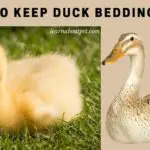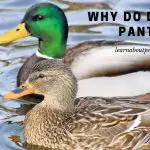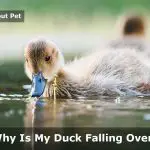If you are thinking of adopting a pet that is adorable, social, someone who will follow you everywhere you go and a pet that bonds with you emotionally, then ducks are probably one of the best choices, but the problem arises when the duck’s poop comes between. You may ask this question in your mind.
Why do ducks poop so much? A duck poops almost 15 times every day, on an average, due to their high metabolism rate. Duck poop is messy. Also, most pet duck owners keep large amount of food in the feeder to have them not restock it often. This means duck can eat more than the recommended portion and could start to poop more.
Ducks generally poop more than chickens, so make sure you can care for them properly before getting them home.
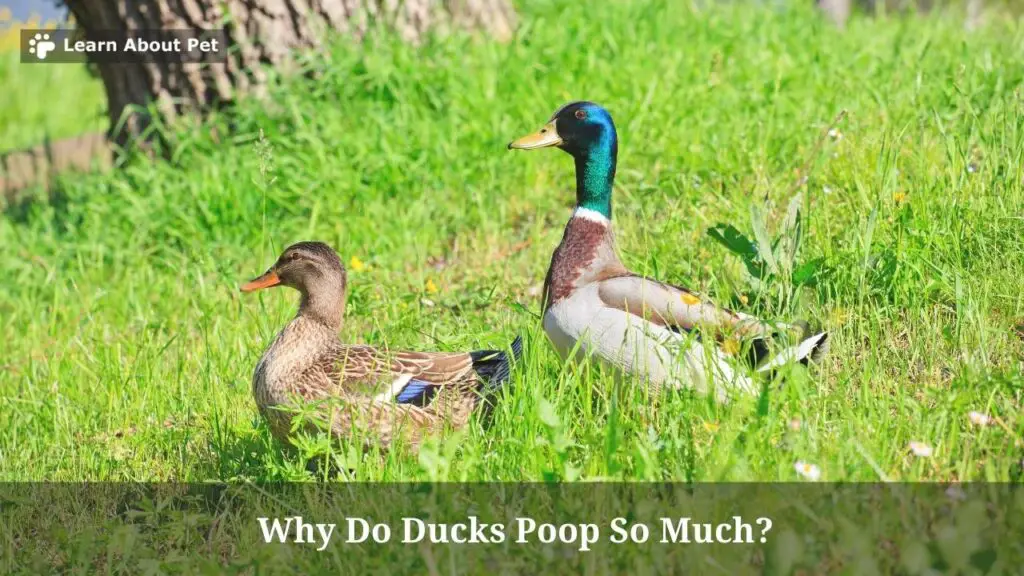
Everyone loves Ducks but their pooping is a common problem a lot of duck owners face. Many duck owners get worried about duck poop and It is certainly a hectic job to clean ducks poop every hour. Many duck lovers avoid adopting a duck due to this problem. Petting a duck becomes more difficult when you are living in a limited space and making sure duck bedding is dry is another challenge in winter.
Are Ducks Messy Pets?
Long answer short, Yes, Ducks are famous for the mess they create. If a person is thinking of adopting a duck that will stay inside their house, they should be ready to clean the poo from everywhere in the house. Ducks may pant and poop a lot and make a lot of mess under stress.
Is Duck Poop Harmful To Humans?
It should be noted that having a duck inside the home can lead to serious problems, petting a duck requires good maintenance at home. If feet come into contact with duck’s poop frequently, it may lead to infections like Psittacosis.
Why Do Ducks Poop So Much?
To answer why do ducks poop so much, duck owners must understand that ducks are Anatidae birds, and they have a fast metabolism. They excrete a lot of waste after eating a lot of food. Ducks pooping a lot is not only due to fast metabolism but also due to the carelessness of owners.
Before asking why do ducks poop so much? A duck owner should understand how much food their ducks need. Hence when the owner feeds a lot ducks poop a lot, but that doesn’t mean that the owner should stop giving them enough food. The pooping problem in ducks is very big, ducks poop more than chickens.
Do Ducks Poop Less Than Chickens?
Ducks are messier than chickens. Ducks tend to poop 3 times more than an average chicken poop daily. Ducks also tend to leave a stinky and messy poop than chicken. Having a dedicated outdoor space is recommended to pet a duck.
Do Baby Ducks Poop A Lot?
Why do ducks poop so much and what about ducklings? Ducklings are on the same page as older ducks when it comes to creating a mess. The pooping problem in ducklings is similar to ducks. The owner of ducklings should change the pine shavings twice a day. Wood shavings coming from tractor supplies are comparatively cheaper and efficient for this use.
How To Clean The Duckling Tubs?
As ducklings get their tub messy very frequently, it is advised to clean it every day two times. To clean the duckling’s tub, Gently transfer your Ducklings to another place. Transfer water and food feeders and clean them at least once a day to keep your duck healthy. Clean the tub with water, efficiently dry the tub and don’t put the towel or shavings on when the tub is still wet.
Refill the feeders and put your duckling in a clean place. It should be noted that cleaning the bedding of ducklings is a requirement. If the tubs stay dirty for a long time, there are possibilities of spread of infection.
Do Ducks Poop Everywhere?
Ducks do a lot of poop. They almost poop anywhere or everywhere they roam. A duck may poop every fifteen minutes and a duckling poops even more than a duck.
To mitigate the problem of ducks pooping everywhere, owners should create boundaries to keep the ducks in a particular space, so it gets easy for the owner to clean the mess.
Can Ducks Control Their Poop?
Ducks spend most of their time searching for food, and when they get the food, it goes in one end, the GI tract chugs along and empties feces of the other end. One of the main reasons why ducks are so is that they can’t control their poop.
The actual reason why do ducks poop so much is that the sphincter muscles that control the poop are not present in the ducks. This is the reason why ducks have no control of their defecation/urination.
What Is Healthy Duck Poop?
Generally, a healthy duck poops green feces but due to the reason that ducks swim a lot, the poop can vary from duck to duck. Overall the duck poop should be clean and dry. Duck poop pictures can also be seen on the internet to compare and understand more about the duck’s health.
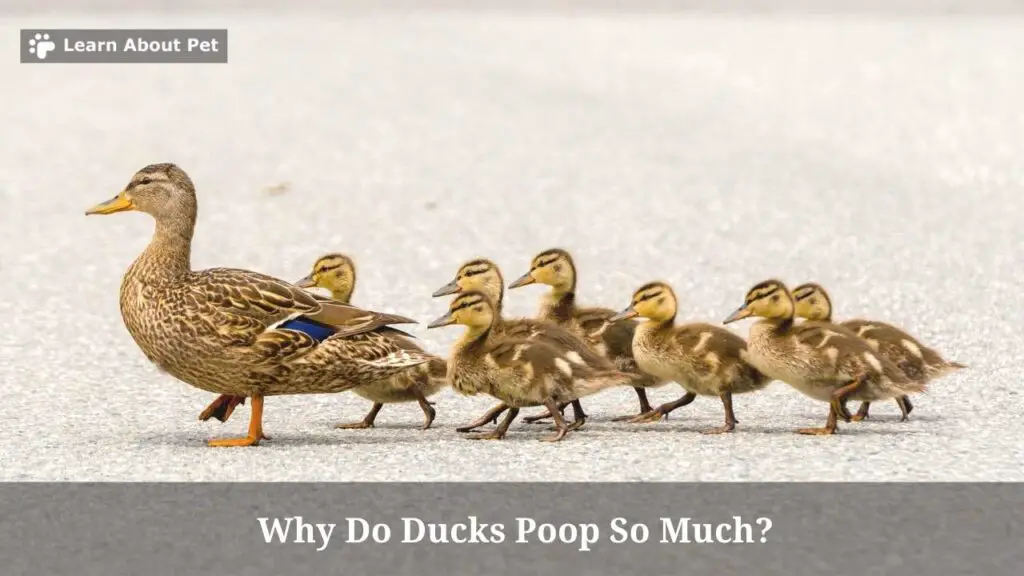
Duck Poop Chart
| Duck Poop Colors | Reason for this type of poop | Should the owner worry? |
| Dark Metallic poop | This type of poop can happen due to some health issues. | A vet should be consulted. |
| Whiteness in poop | It is due to protein consumption. | Nothing to worry about. |
| Green poop | It occurs probably because ducks are eating food of similar colour. | Nothing to worry about. |
| Black gooey poop | This type of poop can happen due to bacteria such as Enterobacter. | The vet should be contacted. |
| Watery poop | This type of poop can either mean that the ducks are drinking a lot of water or it could also be an indication of diarrhoea. | Check for symptoms of diarrhoea, if you think your duck is not normal, you should take advice from a vet. |
| Black soily poop | Black soily poop can occur if the duck is eating soil. Check it and control this habit. | Eating soil can lead to many illnesses in ducks. Ducks should be carefully inspected and owners should prevent them from eating soil. |
| Very dark poop | If a duck is pooping very dark faeces, it can be a sign of some health problems. | A vet should be consulted. |
| Bright green poop | If a duck is pooping bright green faeces, it can be an indication of issues related to the liver. | A vet should be consulted. |
| Red poop | Red poop is most of the time caused by eating red food. If red poop occurs without eating red food, it could be blood. | If the duck is eating red food and pooping red that is normal. But if a duck isn’t eating red and still pooping red faeces, A vet should be consulted as it can be blood. |
| Yellow poop | Yellow poop is most of the time caused by eating yellow food. If yellow poop occurs without eating yellow food, it could be hepatitis. | If the yellow poop is the result of yellow coloured food intake, it’s fine but otherwise, A vet should be consulted as it can be hepatitis. |
| Pink Poop | If a duck is eating food like beetroot, it can lead to pink faeces. | Nothing to worry about. |
| Orange poop | If the duck is pooping orange faeces, the reason might be foods like cantaloupe. | Nothing to worry about. |
| Foamy poop | The occurrence of cocci bacteria can lead to foamy poop | A vet should be consulted |
| Huge and smelly | Maybe because ducks are given excess food. | The owner should keep a check on what and how much they are putting on the duck’s plate. |
| Blood in poop | Blood in poop can be due to damage in intestinal linings or a result of the spread of bacteria like cocci. | A vet should be consulted |
What Should I Do If Ducks Poop A Lot?
Why do ducks poop so much and how do I control them? The only possible way to control ducks from pooping is by putting a diaper on the ducks. Though it is not a sure shot plan as diapers also tend to fall but it is a good measure to control the poop ruining the whole place.
Putting on diapers itself is not an easy task as ducks don’t like putting unfamiliar things on their body. If you have a duckling it is advised to start creating a habit of putting diapers on your duckling.
Another question a duck owner may have is why do ducks eat their poop? It is a very normal duck behavior that can be prevented by taking some measures.
A spacious outdoor setting will help the owner to handle the duck’s poop efficiently. Adding hay in the bedding of ducks can help in keeping the poop absorbed and the hay can be changed every three to four days.
How To Train Ducks To Poop Less?
Many duck owners ask why do ducks poop so much and how to make ducks poop less? Ducks can’t be trained to poop less. Ducks can’t be trained to do activities like popping less. After learning so much about the ducks, are you still determined to try your chance of potty training your duck?
How To Potty Train A Duck?
After understanding why do ducks poop so much, duck owners should understand how to potty train a duck. Though there are few efforts through which many duck owners have potty trained their ducks. But, these steps are not perfect but worth trying.
Noticing the behavior of ducks is a way to track the behavior when a duck starts to poop, like wagging its tail or spreading its wings. It can be anything as all ducks are different and so is their behavior.
Now the owner should notice how much time the duck poops after eating. Once the owners have noticed all these behaviors, for a few days they should put their ducks to the right place when they notice these signs.
Final Verdict – Why Do Ducks Poop So Much
Why do ducks poop so much? Due to the sphincter muscle in ducks that can clench feces for only a few seconds as they would not poop on their egg or in their nest. Furthermore, they do not have a similar system for excretion as other animals as mentioned above, they can’t control their poop, likewise, you can’t train them.
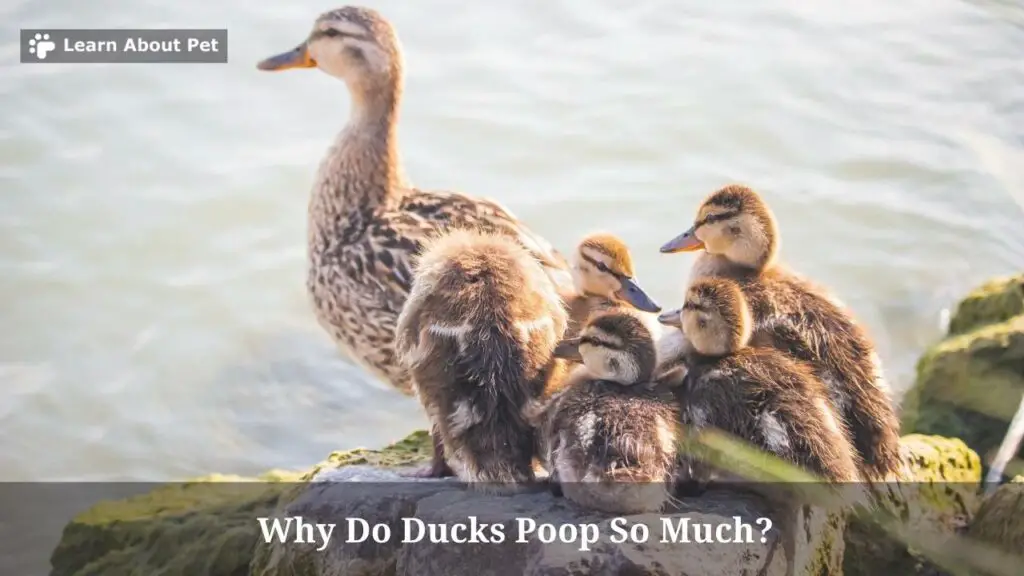
Ducks tend to create a lot of mess but at the same time, they also demand hygiene. Cleaning the surroundings of ducks is the best option for the duck and the owner.
As a pet lover, make sure to learn about pet more and give your pet duck a good and comfortable life!

Welcome to Learn About Pet. My name is Rajkumar Ravichandran and I love all pets, travel, and amazing food. I write about my passion and personal experience caring for multiple pets in this blog! ❤️
Post Disclaimer
DISCLAIMER: THIS BLOG OR WEBSITE, "Learn About Pet", DOES NOT PROVIDE YOU WITH MEDICAL ADVICE AND IS NOT A SUBSTITUTE FOR MEDICAL ADVICE. ALWAYS GET IN TOUCH WITH YOUR PERSONAL VETERINARIAN AND USE INFORMATION HERE AS GENERAL ADVICE.
The information, including but not limited to, text, graphics, images and other material contained on this website are for informational purposes only. No material on this site is intended to be a substitute for professional veterinary advice, food recommendation, diagnosis, or treatment. Always seek the advice of your veterinarian or other qualified health care provider with any questions you may have regarding a medical condition or for pet food related questions.



